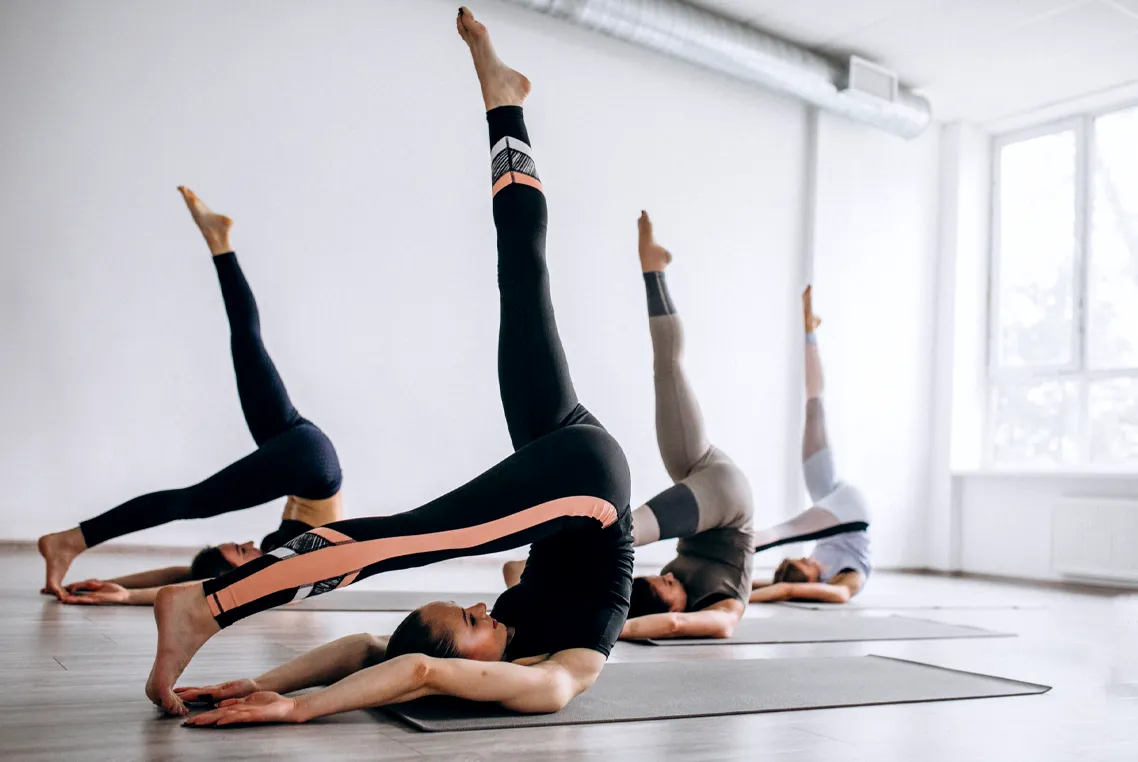
Pilates is one of the most popular fitness trends in the world. With its focus on alignment, core strength, and flexibility, it’s no surprise that people all around the globe are flocking to Pilates classes.
If you’re looking to become a Pilates instructor in Dublin, you’ve probably already heard about the rigorous and demanding training process. But don’t let this scare you off! Being a Pilates instructor is a rewarding and flexible career. If you’re willing to put in the effort, we guarantee that it’s well worth your time and money.
So, how do you get started? What should you do to be able to work as a Pilates instructor in Dublin or elsewhere in Ireland? We’ve put together a guide below to help you understand the steps and requirements. However, please keep in mind that there are many different types of certifications available, and the exact steps will vary depending on the programme.
This is the top question amongst people thinking of becoming qualified Pilates teachers. So, what’s the answer to this? Well, the process of becoming a Pilates instructor in Ireland is easy. All you need is to earn your qualifications. Once you are certified, you can already apply for jobs or start your own practice.
It should be noted that earning your qualifications requires time, effort and money. You need to attend classes and may even need to participate in work experience. This can be challenging if you have work or other responsibilities that demand your attention. The good thing is that several health fitness course providers in Ireland offer part-time Pilates instructor programmes.
Lastly, getting certified gets your foot in the door. However, your success as a Pilates instructor would greatly depend on the time and effort you put into this profession.
You’ll want to make sure you have a strong understanding of the basics of Pilates. This will help you know how to instruct your clients since Pilates is a specific exercise that requires proper technique and alignment.
Additionally, you should be able to communicate effectively with others. You’re going to need the ability to connect with people. This is necessary for them to feel comfortable enough with you. When they are comfortable, they can learn new things from you without feeling overwhelmed by the idea of doing exercises they’ve never done before.
You will also need the willingness to undergo additional training and “upskill”. This way, no matter what type of student comes into your class (like elderly and pregnant people), there’s something for everyone!
The spirit behind Pilates is one of self-exploration and finding what works best for each person. Hence, being able to lead by example is integral here as well! Having good motivational qualities also goes hand-in-hand with this aspect because it helps set good vibes throughout each session, even if participants are struggling through certain movements or not getting much accomplished at first glance due to their own personal reasons.
Choosing a certification program is crucial in your quest to become a Pilates instructor. You will want to make sure that you do your research and select the program that best fits your needs, goals, and schedule.
Please don’t just enrol in the course to earn your certification. Take your training seriously. Remember, you will need the knowledge and skills that you acquire here to hit the ground running. Moreover, if you want to be the best Pilates instructor in Dublin, then you need good foundational knowledge.
Depending on where you take your course (and what kind), how long it lasts will vary. However, accredited programmes like the NTC’s Pilates Instructor Course run for around 6 months. These multi-week programmes have weekly classes that allow students more time to absorb information and undergo hands-on training.
Despite the spread-out schedule, completing the requirements may still feel overwhelming at some point. But don’t let this stop you from reaching the finish line. Stay the course! Focus on your goal, study and be disciplined!
You should also consider getting insurance. Insuring yourself is essential, even if you’re just starting out in the industry.
Once you have gotten your certification and acquired your insurance, the next step is to start working. You can apply at studios, fitness centres, health clubs or gyms in Dublin or even abroad. You can even join sporting teams or organisations that have included Pilates as part of their conditioning routine. Lastly, you can build your own business by working as a freelance Pilates instructor.
Are you ready to become a Pilates instructor in Dublin? Enroll in our sought-after Pilates Instructor course, accredited by YMCA Awards and REPs Ireland. Book your place today! Contact us here or call us at 01 882 7777.

ONSITE LESSONS
Practical classes take place either at NTC or SPORTSCO, Ringsend, Dublin 4
Saturday from 10:30am to 1pm and 2pm to 4:30pm
July 2025 – 26th♦
August 2025 – 9th, 16th, 23rd, 30th
September 2025 – 6th, 13th, 20th, 27th
October 2025 – 4th, 11th, 18th♦, 25th
November 2025 – 1st, 8th♦, 15th, 22nd, 29th, 30th
December 2025 – 6th & 7th
Examinations and/or class will start at 9:30am on dates indicated with ♦
ONLINE LESSONS
Tuesday and Thursday Evenings from 7pm to 9pm
(Recordings available afterwards)
July 2025 – 29th, 31st
August 2025 – 5th, 7th, 12th, 14th, 19th, 21st, 26th, 28th
September 2025 – 2nd, 4th, 9th, 11th, 16th, 18th, 23rd, 25th, 30th
October 2025 – 2nd, 7th, 9th, 14th, 16th, 21st, 23rd
OPTIONAL FREE COURSE
National Qualification in Kettlebell Training
November 2nd, 2025 – Sunday from 10:00-17:00